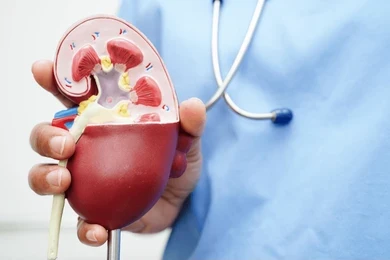
Introduction
Renal kidney disease, also known as chronic kidney disease (CKD), is a serious condition that affects kidney function over time. Proper treatment is crucial to slowing disease progression, managing symptoms, and preventing complications. Treatment approaches include medications, dietary adjustments, lifestyle changes, and, in severe cases, dialysis or kidney transplantation.
Key Treatment Approaches for Renal Kidney Disease
1. Medications to Manage Symptoms and Slow Progression
- Blood Pressure Control: ACE inhibitors and angiotensin II receptor blockers (ARBs) help protect kidney function.
- Diabetes Management: SGLT2 inhibitors and GLP-1 receptor agonists can reduce kidney damage in diabetic patients.
- Reducing Proteinuria: ACE inhibitors and ARBs also help decrease excessive protein loss in urine.
- Anemia Management: Erythropoiesis-stimulating agents (ESAs) and iron supplements improve red blood cell levels.
2. Dietary Modifications
- Low-Sodium Diet: Helps control blood pressure and fluid retention.
- Protein Moderation: Limits excess strain on the kidneys while ensuring adequate nutrition.
- Potassium and Phosphorus Control: Avoiding high-potassium foods (e.g., bananas, potatoes) and processed foods helps maintain balance.
- Fluid Intake Regulation: Adjusting fluid intake prevents overloading the kidneys and worsening symptoms.
3. Lifestyle Changes to Support Kidney Health
- Exercise: Regular physical activity improves blood pressure and cardiovascular health.
- Smoking Cessation: Reduces kidney damage and overall health risks.
- Alcohol Moderation: Limits additional strain on kidney function.
- Weight Management: Helps prevent diabetes and high blood pressure, which are leading causes of CKD.
4. Dialysis for Advanced CKD
- Hemodialysis: A process where a machine filters waste and excess fluid from the blood.
- Peritoneal Dialysis: A home-based dialysis method using the lining of the abdomen to remove waste.
- Choosing the Right Option: Patients should work with healthcare providers to determine the best dialysis approach.
5. Kidney Transplantation
- Best Long-Term Solution: A healthy donor kidney can restore normal kidney function.
- Eligibility and Considerations: Not all patients qualify, and finding a compatible donor is essential.
- Post-Transplant Care: Life-long immunosuppressive medications are needed to prevent organ rejection.
Conclusion
Renal kidney disease treatment involves a comprehensive approach combining medication, dietary changes, and lifestyle adjustments to slow progression and improve quality of life. For advanced stages, dialysis or kidney transplantation may be necessary. Regular monitoring and collaboration with healthcare providers are key to effective management. If diagnosed with CKD, early intervention is essential to maintaining kidney function and overall well-being.

